Key takeaways:
- Upbringing involves both explicit lessons and implicit messages, shaping resilience, kindness, and emotional responses to challenges.
- Family influence instills empathy, integrity, and support, often seen through storytelling and shared experiences.
- Cultural experiences create a sense of identity and belonging, enriching understanding and respect for diversity.
- Real-life experiences, like volunteering or collaborative projects, can redefine beliefs and underscore the importance of compassion and responsibility.
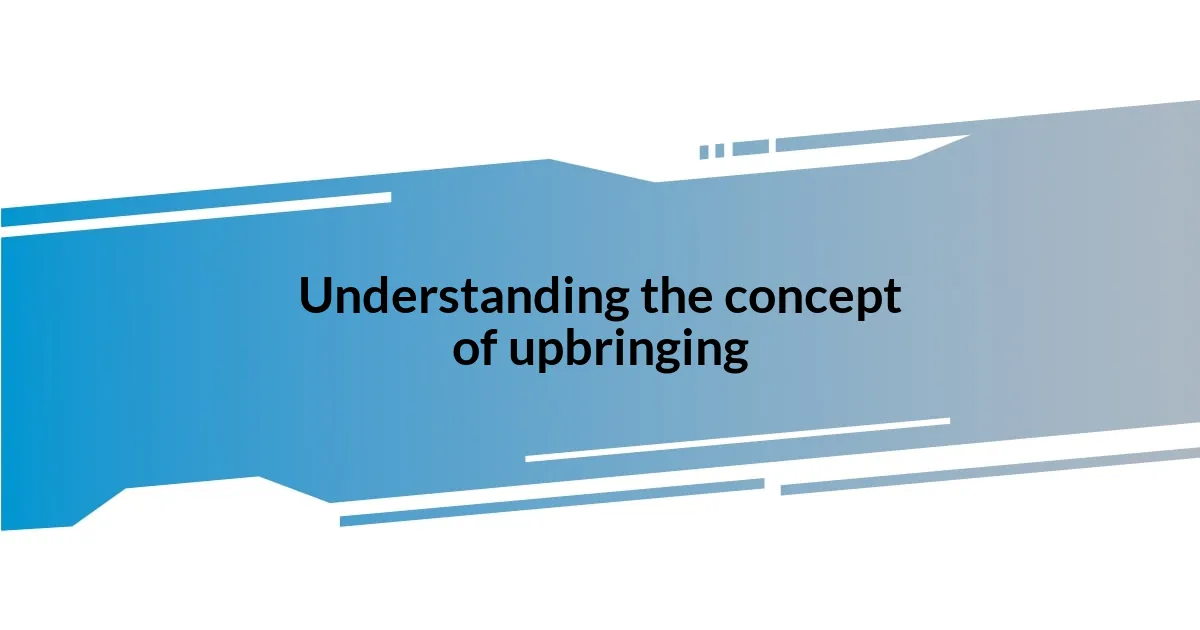
Understanding the concept of upbringing
Upbringing encompasses the environment, beliefs, and values instilled in us from an early age. It’s fascinating to reflect on how my parents’ relentless encouragement shaped my confidence. They often said, “Don’t be afraid to fail; that’s where the growth lies.” Has there ever been a phrase that motivated you to pursue something beyond your comfort zone?
As I navigated through childhood, I learned that upbringing isn’t just about rules and discipline; it’s also about emotional support and understanding. I recall a moment when I stumbled in a school play—my mother was there with a hug and gentle words that soothed my anxiety. This experience taught me the significance of resilience and kindness, which I carry to this day.
Our upbringing comprises both the explicit lessons and the silent messages conveyed through our parents’ actions. I often wonder, how much of our emotional responses to challenges are shaped by what we absorbed as children? When I face tough situations, I can almost hear the echoes of my parents’ voices guiding me. It’s a reminder that we carry a piece of our upbringing with us wherever we go.
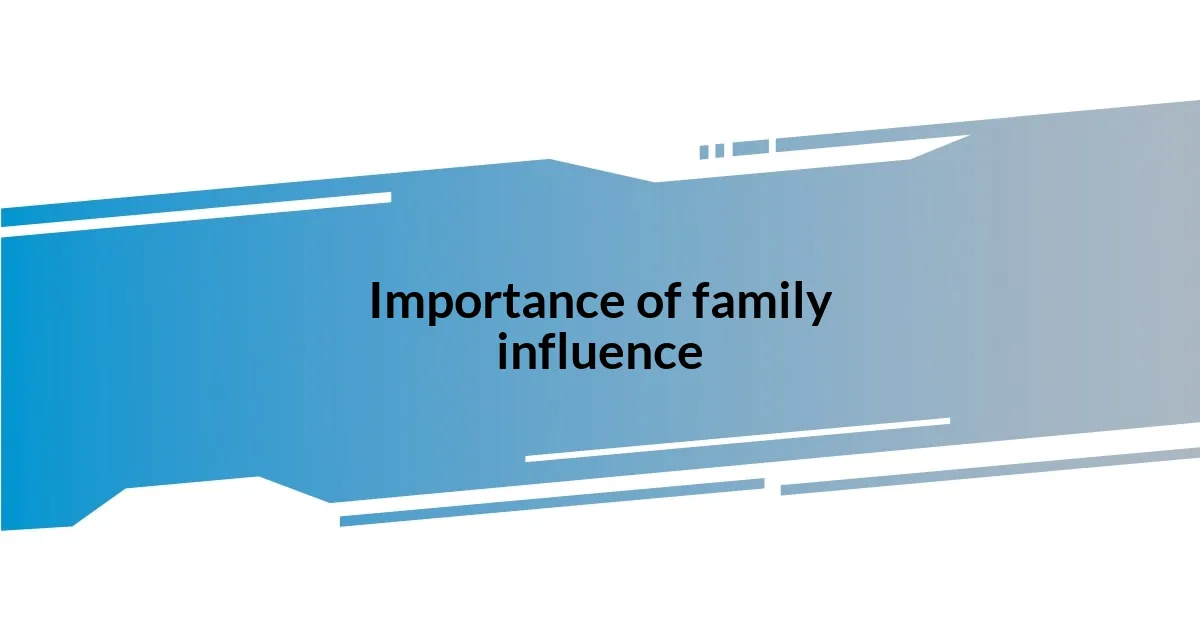
Importance of family influence
The influence of family cannot be overstated. I remember family gatherings filled with laughter and storytelling, where my grandparents shared their life experiences. These moments taught me the importance of connection, instilling a deep sense of empathy and respect for others. Have you ever felt a warmth in your heart while listening to stories from your loved ones? It’s those tales that create a tapestry of values we carry with us.
As I’ve grown older, I’ve come to realize that the lessons learned at home often shape our interactions with the world. For instance, my father constantly emphasized the virtue of honesty, sharing a story about a time he faced a moral dilemma at work. His transparency in that situation not only influenced my understanding of integrity but also helped build a foundation of trust in all my relationships. How often do we find ourselves at a crossroads, recalling such pivotal lessons from our upbringing?
Family values often manifest in unexpected ways. I think back to my mother’s unwavering support for my dreams, regardless of how unconventional they may have seemed. Her belief in me inspired a sense of determination that drives my ambitions today. Wouldn’t you agree that sometimes, a family member’s faith in us can inspire us to reach greater heights than we ever imagined?
| Aspect | Family Influence |
|---|---|
| Emotional Support | Instills resilience through encouragement during tough times |
| Values and Morals | Shaped by parents’ beliefs, leading to strong personal integrity |
| Connection and Empathy | Family stories create a sense of belonging and understanding of others |
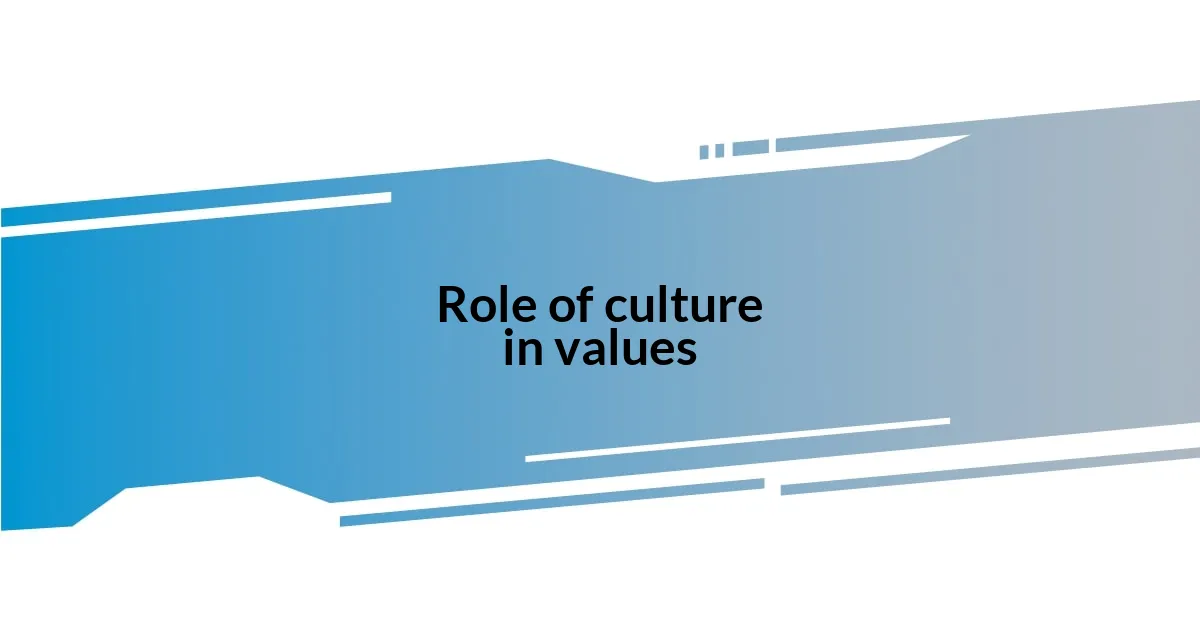
Role of culture in values
Culture plays a profound role in shaping our values, weaving a rich tapestry of beliefs and traditions that influence our everyday lives. I remember a family celebration centered around an important cultural festival, where the collective joy and rituals emphasized the importance of community. This experience taught me the value of togetherness and the significance of honoring our roots. It’s intriguing how cultural practices can not only reflect our heritage but also instill a framework of ideals that guide us as we navigate life.
- Cultural narratives often define what is considered right or wrong, providing a moral compass.
- Sharing traditions creates a sense of identity and belonging, reinforcing personal values.
- Cultural diversity enriches our understanding of different perspectives, enhancing empathy and open-mindedness.
- Celebrating community achievements fosters a sense of pride and responsibility towards others.
Reflecting on my experiences, I can’t help but feel a deep appreciation for how culture has molded my worldview. Think back to a time when you participated in a cultural event—didn’t it awaken feelings of pride and connection? I can easily recall sharing meals with friends from different backgrounds, where each dish told a story and helped me understand their values more deeply. Through these interactions, I learned that embracing cultural diversity not only broadens our horizons but also cultivates respect for different belief systems.
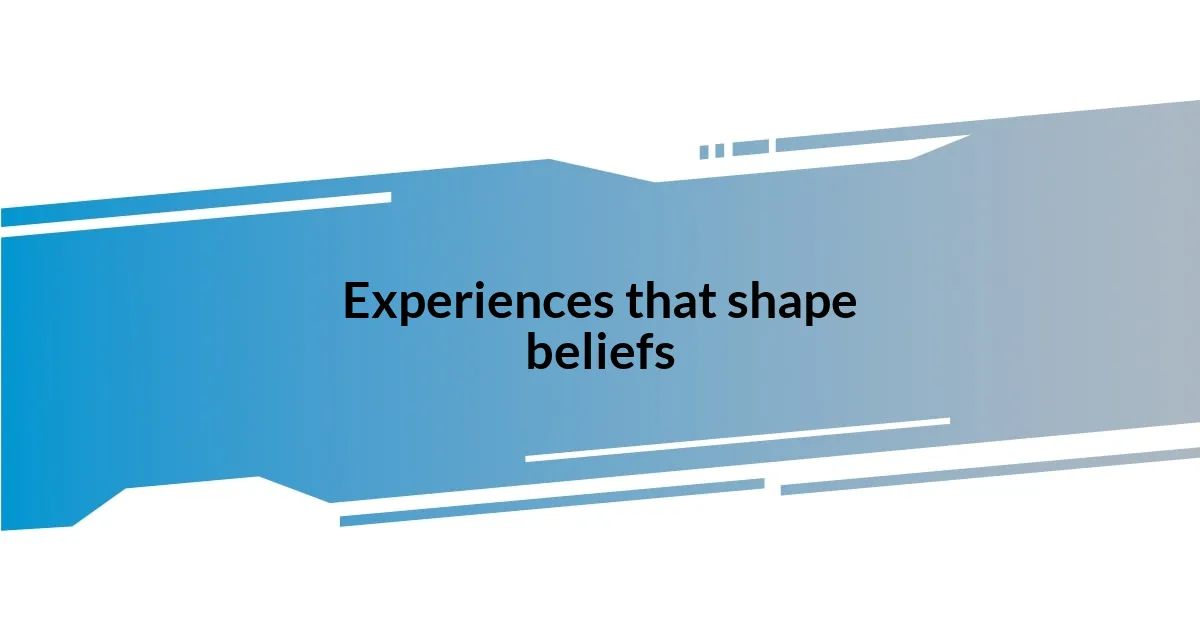
Experiences that shape beliefs
Experiences that shape beliefs often arise from unexpected places. I vividly recall a high school project where I worked alongside peers from various backgrounds. It was during those long nights of collaboration that I realized how different perspectives could broaden my understanding of acceptance. Have you ever experienced a moment where someone’s story completely shifted your view? Those interactions taught me that belief systems are often shaped by our willingness to listen and connect.
Another defining moment for me was volunteering at a local shelter. Witnessing the resilience and hope of individuals facing hardship was eye-opening. As I engaged with them, I began to appreciate the profound impact of compassion and charity in our lives. I found myself reflecting on my own privileges, which deepened my commitment to helping others. Doesn’t it strike you how real-life experiences often serve as catalysts for our core beliefs?
Looking back, even small, everyday interactions have left lasting impressions on my beliefs. For instance, I remember a simple but powerful conversation with a friend about environmental responsibility. Her passion for sustainability was contagious and ignited a spark within me. It prompted me to examine my habits and the choices I made. Have you ever had a casual chat that nudged you in a new direction? Those seemingly trivial moments can redefine our values in ways we never anticipate.
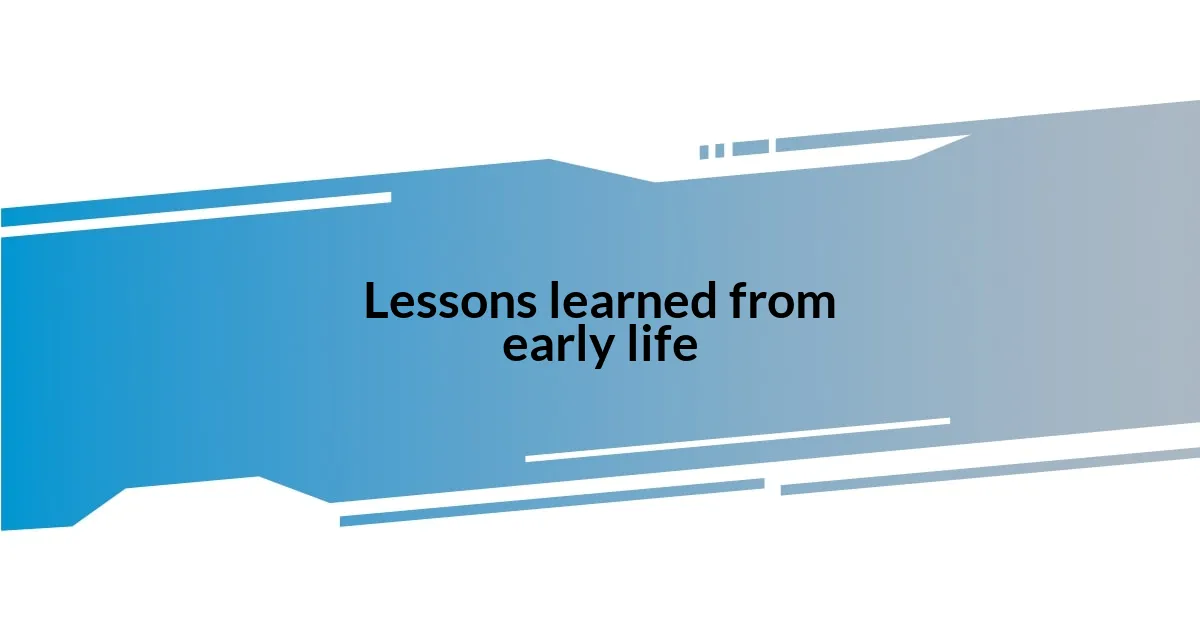
Lessons learned from early life
The early moments of life often come with lessons that leave indelible marks on our values. I remember my parents emphasizing the importance of honesty, especially during small family discussions. They’d ask us to reflect on our actions and how they impacted others. This instilled a strong sense of integrity in me, where being truthful became not just a habit, but a core part of my identity. Have you ever found that a simple lesson from childhood shaped your decisions as an adult?
As I grew older, I learned about the value of resilience through my own struggles. Whether it was a difficult school project or a challenge in a social setting, I began to see that failures are often stepping stones to improvement. I can still recall the disappointment of not making a sports team, which taught me not to fear setbacks, but to face them head-on. Isn’t it remarkable how what we view as a failure can transform into a valuable lesson in perseverance?
Family gatherings were also rich with lessons on empathy and kindness. I vividly remember evenings spent listening to my grandmother share stories of her life. Her tales often included moments where she extended a helping hand to those in need, which showed me the profound impact of compassion. It made me wonder—how often do we take the time to listen and truly understand each other? Through her stories, I learned that a small act of kindness can ripple outwards, influencing those around us in ways we may never fully appreciate.
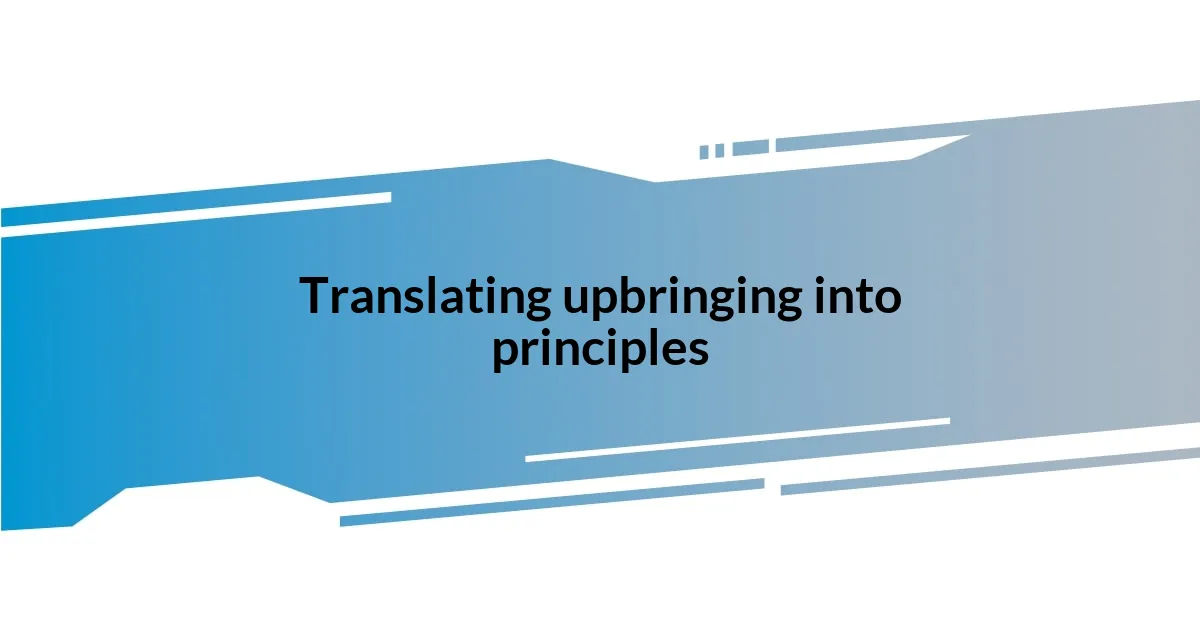
Translating upbringing into principles
Translating my upbringing into principles is a journey marked by the wisdom passed down through generations. Growing up, my parents often shared anecdotes from their own childhoods, revealing the values they held dear. One story that stuck with me was about my mother’s commitment to hard work; she described how her family had next to nothing but rose above their circumstances through sheer determination. It makes me wonder—how often do our family stories shape our personal ethos without us even realizing it?
In our household, we often engaged in discussions about fairness and justice. I recall an incident where my siblings and I argued over chores. My parents stepped in to remind us that teamwork wasn’t just about getting through tasks; it was about creating a sense of community even within our own family. Those moments helped crystallize my belief in collaboration and mutual support as fundamental principles in life. Have you ever had a family debate that revealed deeper truths about your values?
As I reflect on my upbringing, it’s clear that my experiences have woven together to form a tapestry of values. I think back to my volunteer work with children from disadvantaged neighborhoods. The connection I formed with them underscored the importance of advocacy and giving back, principles I strive to integrate into my daily life. Isn’t it fascinating how our backgrounds and experiences can guide us in establishing a life philosophy? Each encounter, whether big or small, serves as a reminder of the principles we choose to uphold.
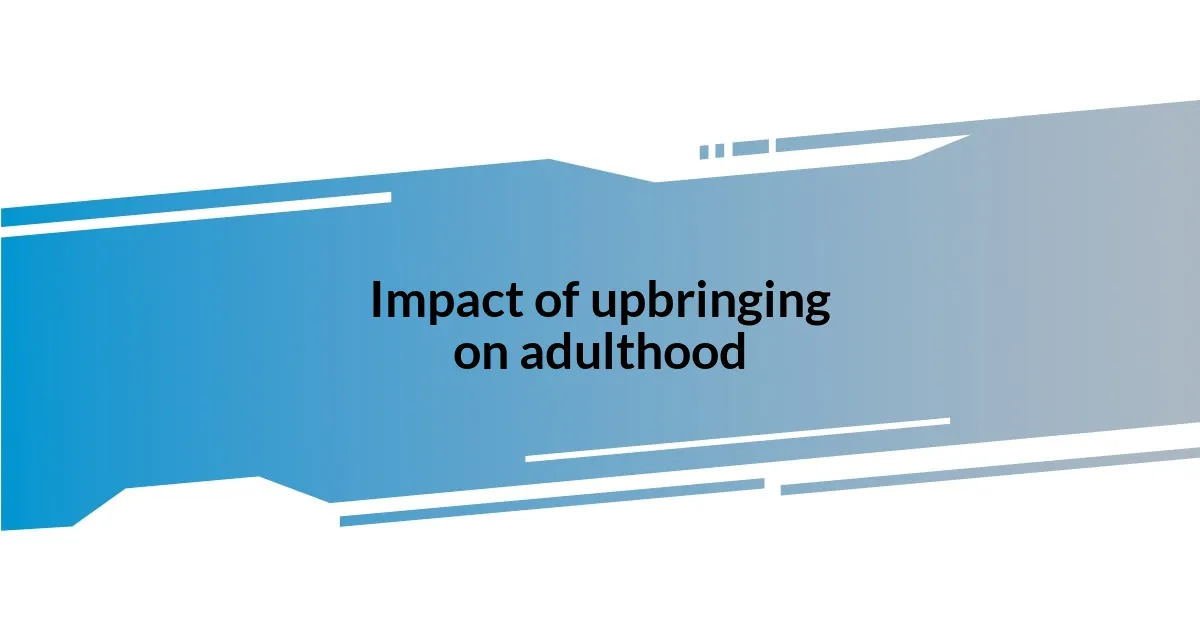
Impact of upbringing on adulthood
Growing up surrounded by the values imparted by my family, I began to see how those teachings colored my view of the world in adulthood. For instance, the countless times my parents encouraged me to put myself in someone else’s shoes shaped my ability to empathize today. Have you ever realized how a single lesson can forge lifelong habits?
As I transitioned into adulthood, the lessons about responsibility weighed heavily on my shoulders. I recall a summer job where I had to work late nights to make ends meet. Those gritty hours taught me not just about earning money, but about accountability and the true meaning of hard work. Looking back, I can’t help but appreciate how that experience prepared me for the challenges I face now—doesn’t it make you think about how the past shapes your present?
Another powerful lesson came when I experienced the pain of losing a family member. It was through that grief that I learned the importance of cultivating relationships and expressing love openly. I often reflect on the warmth of family gatherings after that loss, where we leaned on each other for support. This realization deepened my commitment to nurturing connections in my life. Isn’t it striking how the moments where we feel most vulnerable can guide us towards our greatest values?